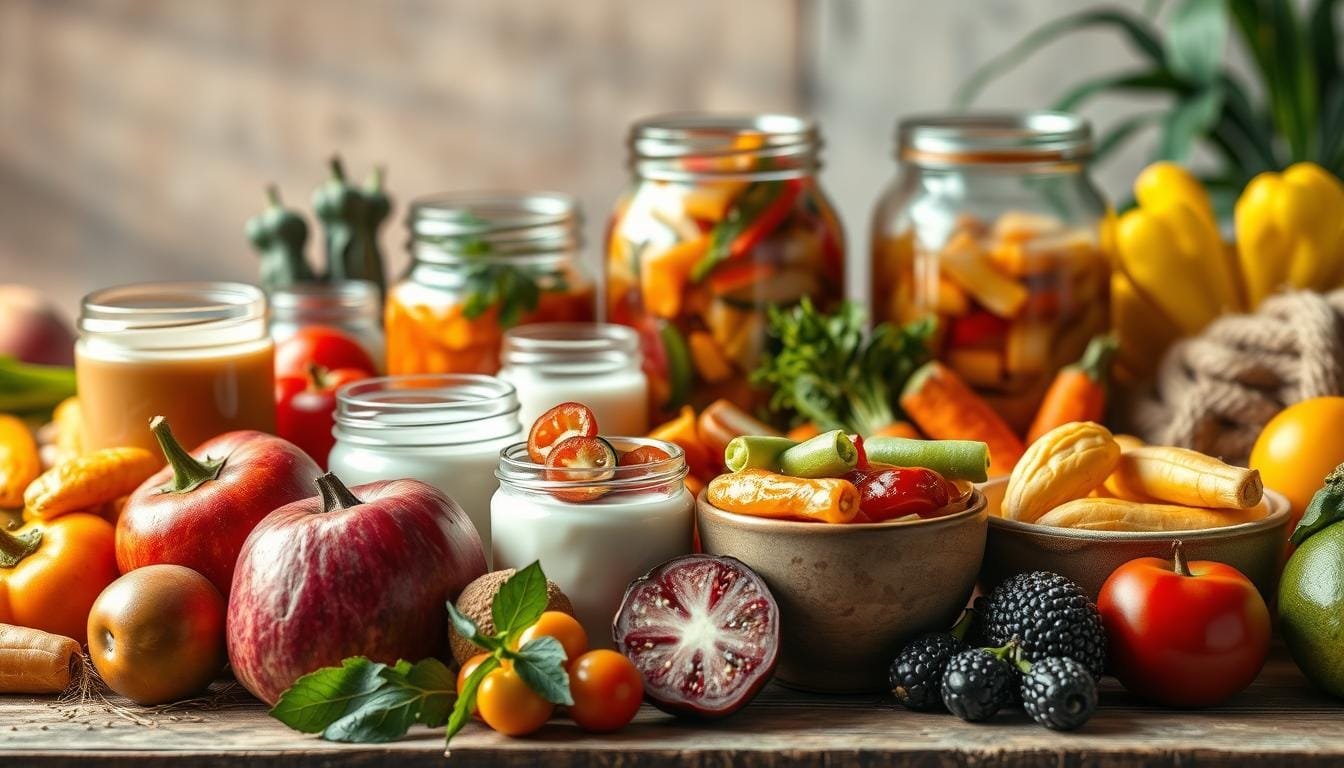Currently Empty: RM0.00
Good digestion starts with a healthy gut, and Malaysians are discovering how small dietary changes can make a big difference. Live microorganisms like beneficial bacteria play a vital role in balancing digestion, supporting immunity, and even improving mood. These natural allies thrive in fermented items that blend seamlessly with local flavors.
Traditional Malaysian meals already include ingredients that support wellness. By adding more cultured options, families can boost their meals without sacrificing cultural preferences. Think of tangy tempeh in sambal or refreshing lassi paired with spicy dishes—these choices enhance both taste and well-being.
Whole-food sources offer more than just probiotics. They provide fiber, vitamins, and antioxidants that work together for better results than supplements alone. This approach helps address common concerns like bloating or frequent colds by strengthening the body’s natural defenses.
Wellness Concept makes it easy to start this journey. Their team guides Malaysians daily on simple ways to include these powerful ingredients. Call +60123822655 any weekday for personalized advice tailored to your lifestyle.
Key Takeaways
- A balanced gut supports digestion, immunity, and mental clarity.
- Fermented foods complement Malaysian cuisine while boosting wellness.
- Whole-food options provide extra nutrients compared to supplements.
- Diverse gut bacteria help prevent digestive issues and seasonal illnesses.
- Local markets offer accessible probiotic-rich ingredients for daily meals.
- Expert guidance simplifies adopting gut-friendly eating habits.
Introduction to Probiotics and Gut Health
Trillions of microorganisms live in the human body, forming a bustling ecosystem that influences everything from energy levels to emotional balance. Among these, probiotics act as nature’s peacekeepers, maintaining harmony between different bacterial communities. These live microbes don’t just survive in the gut—they actively shape its environment to support overall wellness.

Understanding Microbial Allies
Not all bacteria are created equal. Strains like Lactobacillus and Bifidobacterium serve distinct roles:
| Strain Type | Primary Function | Health Impact |
|---|---|---|
| L. acidophilus | Breaks down lactose | Reduces bloating |
| B. longum | Neutralizes toxins | Boosts immunity |
| L. rhamnosus | Balances pH levels | Supports skin health |
These strains work together to process nutrients, crowd out harmful pathogens, and even produce vitamins. A detailed exploration of probiotics reveals how they adapt to different parts of the digestive system, from the stomach to the colon.
Gut-Immune Connection Explained
Did you know 70% of immune cells reside in the gut? A balanced microbiome trains these cells to distinguish between threats and harmless substances. This reduces unnecessary inflammation and helps the body respond faster to genuine dangers like viruses.
Modern stressors—like antibiotics or processed meals—can disrupt this delicate balance. Regularly consuming probiotic-rich items helps replenish friendly bacteria, creating a resilient internal defense system. The result? Fewer digestive hiccups and stronger resistance to seasonal bugs.
Foods high in probiotics: Essential Picks for Gut Health
Diverse cultures offer fermented treasures that do more than tantalize taste buds—they nourish your inner ecosystem. These living foods act as nature’s maintenance crew, repairing and revitalizing digestive pathways with every bite.
Yogurt, Kefir, and Traditional Buttermilk
Yogurt reigns supreme as a creamy staple packed with lactic acid bacteria. A single serving delivers calcium and protein while balancing gut flora. Malaysian markets now offer coconut-based versions for lactose-sensitive individuals.
Kefir outshines regular yogurt with 30+ microbial strains. Its tangy fizz pairs perfectly with tropical fruits like mango or papaya. “This drink’s yeast-bacteria combo helps break down milk sugars efficiently,” notes a Kuala Lumpur nutritionist.
| Dairy Option | Key Strains | Malaysian Twist |
|---|---|---|
| Yogurt | L. bulgaricus, S. thermophilus | Pandan-flavored varieties |
| Kefir | Lactococcus, Acetobacter | Mango-lassi fusion drinks |
| Buttermilk | Leuconostoc mesenteroides | Used in savory kuih recipes |
Sauerkraut, Kimchi, and Other Fermented Vegetables
Sauerkraut’s fermented cabbage provides vitamin C and eye-protecting antioxidants. Try it with nasi lemak for a crunchy contrast. Kimchi brings Korean flair to local tables—its chili-spiked Lactobacillus strains survive Malaysia’s heat better than European varieties.
Home fermentation lets families customize flavors. Try pineapple-infused pickled carrots or turmeric-spiked radishes. These colorful jars boost meals with live cultures and prebiotic fiber.
Tempeh, Miso, Natto, and Specialty Cheeses
Tempeh’s fermented soybeans offer meat-free protein and rare B12 vitamins. Pan-fry it with sambal for a gut-friendly rendang alternative. Miso paste transforms soups into probiotic powerhouses—stir it into ABC soup base for depth.
Cheese lovers can opt for aged cheddar or gouda. These contain surviving cultures that withstand Malaysia’s humid climate when stored properly. Pair with whole-grain crackers for a satisfying snack.
Popular Fermented Foods and Their Unique Benefits

Fermentation isn’t just preservation—it’s a culinary alchemy that boosts both flavor and wellness. This natural process unlocks hidden nutrients while creating tangy flavors Malaysians love in dishes like acar and tapai.
Nutritional Power Unleashed
The fermentation process acts like a food upgrade. It breaks down hard-to-digest compounds while boosting nutrient content. For example:
- Soybeans gain vitamin B12 through fermentation—a rare plant-based source of this energy-boosting nutrient
- Phytic acid levels drop by 50% in tempeh, letting your body absorb more iron and zinc
- Kimchi develops antioxidants not found in fresh cabbage
Gut Guardian Effects
Fermented items do double duty for health. Their pre-digested components ease digestion, while live cultures strengthen gut defenses. Research shows regular consumers experience:
| Benefit | Mechanism | Local Impact |
|---|---|---|
| Faster nutrient absorption | Broken-down proteins & carbs | Reduces bloating after spicy meals |
| Stronger immunity | 70% immune cells supported | Fewer seasonal colds |
| Balanced inflammation | Organic acids regulate responses | Eases allergy symptoms |
As one KL nutritionist puts it: “Fermented foods train your gut like a friendly gym coach—strengthening what matters without harshness.” From controlling blood sugar to calming IBS flare-ups, these living foods offer solutions tailored to Malaysia’s climate and cuisine.
Integrating Probiotic-Rich Foods into the Malaysian Lifestyle
Malaysian kitchens can become gut-health hubs without disrupting cultural traditions. Begin with small additions—a spoonful of yogurt in breakfast roti canai or kimchi alongside lunchtime nasi lemak. This gradual approach helps digestive systems adapt while preserving beloved flavors.
Local Dietary Tips and Recipe Ideas
Transform familiar dishes into probiotic powerhouses:
| Traditional Dish | Probiotic Boost | Health Benefit |
|---|---|---|
| Curry Laksa | Add tempeh cubes | Increases protein & B12 |
| Cendol Dessert | Swap syrup for kefir | Reduces sugar content |
| Acar Pickles | Use brine as dressing | Enhances nutrient absorption |
Homemade fermented vegetables thrive in Malaysia’s climate. Try pineapple rind vinegar or turmeric-infused jeruk—they add zing to meals while supporting immunity. Always store live cultures away from direct sunlight to preserve their potency.
Wellness Concept: Your Gut Health Partner
Struggling to balance taste and wellness? Wellness Concept specialists craft personalized plans using locally available ingredients. Their team explains:
“Pair probiotic items with prebiotic fibers like banana or oats for maximum impact. This combo feeds good bacteria while keeping meals satisfying.”
Reach them via WhatsApp at +60123822655 weekdays 9:30 AM-6:30 PM or weekends until 5 PM. They’ll help you navigate supermarket labels, fermentation basics, and portion control—making gut-friendly eating effortless for Malaysian families.
Conclusion
Every meal offers a chance to nourish both body and community through smart choices. Malaysia’s vibrant culinary scene blends tradition with modern health benefits, featuring staples like fermented soybeans in tempeh or tangy sauerkraut alongside local favorites. These living cultures strengthen gut lining and crowd out harmful bacteria naturally.
While supplements provide concentrated doses, whole-food sources deliver extra vitamins and enzymes. A daily spoonful of miso in soup or yogurt-based dips creates lasting improvements in digestion and immune responses. The key lies in consistency—small, flavorful additions build resilient microbiomes over time.
Wellness Concept simplifies this journey with practical advice tailored to Malaysian kitchens. Their experts help families pair probiotic-rich items with prebiotic fibers for maximum impact. Reach them at +60123822655 to craft a gut-friendly eating plan that celebrates local flavors while boosting vitality.
From market stalls to home recipes, nurturing your inner ecosystem has never tasted better—or mattered more for overall wellness.
FAQ
What makes fermented foods beneficial for gut health?
Fermented foods undergo a natural process where live bacteria break down sugars, creating probiotics. These “good” bacteria support digestion, balance gut flora, and strengthen the immune system. Examples like kimchi and yogurt are rich in these microbes.
Are probiotic-rich foods easy to find in Malaysia?
Yes! Local markets and supermarkets often stock tempeh, miso, and traditional pickled vegetables. Brands like Marigold and Fernleaf offer yogurt and kefir, while homemade options like asam boi (salted plums) add a tangy probiotic boost to meals.
Can probiotics help with digestive issues like bloating?
Certain strains in fermented products, such as Lactobacillus in yogurt or Bifidobacterium in kefir, may reduce bloating by improving gut balance. However, results vary, so pairing them with fiber-rich foods and staying hydrated is key.
How does fermentation enhance the nutritional value of foods?
The fermentation process breaks down complex nutrients, making them easier to absorb. For instance, tempeh becomes a protein powerhouse, while sauerkraut gains vitamin C. It also preserves food naturally, reducing the need for additives.
Is it safe to consume probiotic foods daily?
Most people can enjoy them daily in moderation. Start with small servings—like a spoonful of kimchi or a cup of kefir—to let your gut adjust. Those with sensitivities or certain health conditions should consult a healthcare provider first.
What are dairy-free alternatives for probiotic intake?
Coconut-based yogurt, water kefir, and fermented soy products like natto or miso are great options. Pickled vegetables, kombucha, and tempeh also provide diverse strains without dairy.
How long does it take to notice improvements in gut health?
Some experience better digestion within days, while others may need weeks. Consistency matters—pairing probiotic-rich choices with a balanced diet and stress management accelerates benefits.
Can probiotic foods aid in weight management?
Certain strains may influence metabolism and reduce cravings, but they’re not a magic solution. Combining them with whole foods, exercise, and portion control supports sustainable weight goals.
Where can I get personalized advice on adding probiotics to my diet?
Reach out to nutrition experts via WhatsApp at +60123822655 during business hours. They offer tailored meal plans and tips to align with your lifestyle and health needs.


